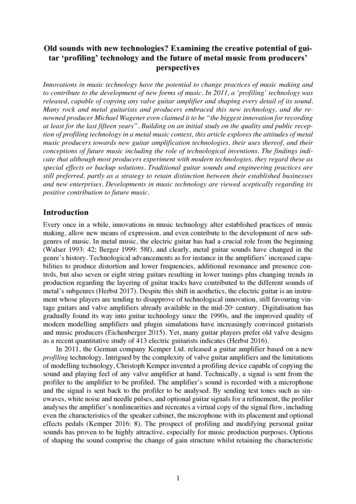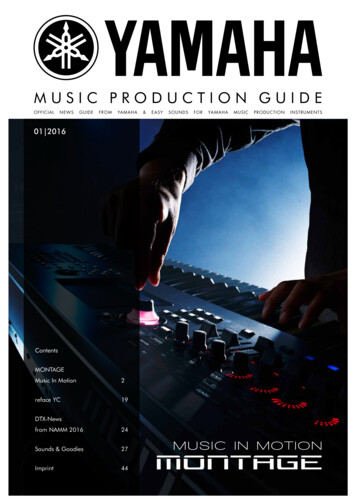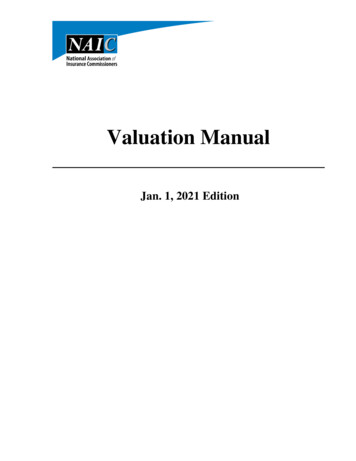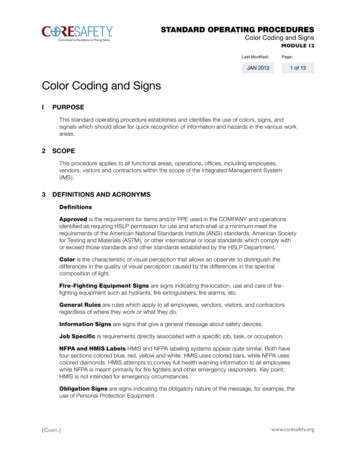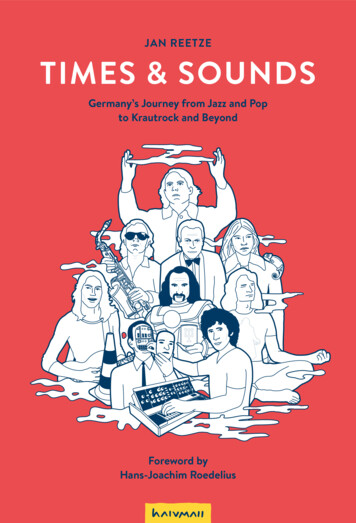
Transcription
JAN REETZETIMES & SOUNDSGermany’s Journey from Jazz and Popto Krautrock and BeyondForeword byHans-Joachim Roedelius
CONTENTSForeword by Hans-Joachim Roedelius7Kaiser’s Reich262What’s It All About?8Stockhausen, Carlos, Sala & Co.: Electronic Revolution287Schoener, Fricke, Moroder: The Munich Moog Pioneers30 118Berlin School314Rubble Years20Music From the Road of Fairytales325Teenager Melody28Düsseldorf School342Some Questions of Infrastructure46Hamburg: The Hanseatic Way367Agitprop38058Seventies in Bits and Pieces397Choo-Choo Trains and Telstar60Turn On, Tune In42 7The Star-Club: Where It All Started79Liberation436Beat of the Wirtschaftswunder91THE BEGINNINGTHE SIXTIESMusician’s Daily Routines101Beat-Club & Co.: Music on German TV115New Technology444The Misleading Magic of Sixty-Eight125Ice Age451Munich Riots and the Start of Krautrock142Women’s Power471Angels of Chaos154Silver & Screen47 7Confounding the Ghosts172THE EIGHTIESTHE FUTURETHE SEVENTIES192Retropia442486488Future’s Calling194Amateurs and Professionals210THE ENDBeing Professional225Notes508Studios and Producers243Sources514Conny Plank, Dieter Dierks255Index520
WHAT’S IT ALL ABOUT?When you happen to watch 40-year old TV commercials, they are not onlysomething to smile about, but they will also give you a lot of background information about the time when they were originally shown. If you can read thesigns, they will give you an idea about how people were thinking; you can seetheir wishes and their hopes, sometimes even their sorrows and problems. It’s 40years later now and you realize that in reality most things didn’t happen the waythey thought it would. In retrospect, we can see how and why.8What goes for TV commercials, goes similarly for music. Germany’s dailylife and culture mirrors itself in the music Germans listen to. When you readabout it, you will learn a lot about Germany’s cultural, political, and everydaybackground as well. These topics are interwoven; they are connected and influence each other. As music everywhere in the world, most German music cameabout not just “under the circumstances” Germans lived in, it came about becauseof the circumstances of certain times, and sometimes it had an influence on thosecircumstances.You know the term “Krautrock”. There is no clear definition, but it refers toGerman rock music from the late 1960s to the late 1970s. The title of Frumpy’sfirst album, All Will Be Changed (1970), clearly shows the atmosphere of departure this rising Krautrock scene had. Krautrockers, as one of today’s several folktales about German rock music goes, followed their ideas in radical consequence.They defied all of the world and its brother, along with their audience and theA&R departments of their record companies (given they were signed), and didwhat the Lord or his chemical brothers planted into their heads. They were supposed to have done it this way because they were Germans, and Germans, as youknow, always stand with one leg in the past and with one leg in the future, butyou will never find them in the present.But on their second album, Frumpy already signaled a note of caution:“Take Care of Illusion”. In reality, many bands had to walk several twists andturns before they finally found their niche, style and (if they were lucky) audience. Most of them failed or gave up. But to not exactly know one’s path is notonly something negative, it can also be seen as a chance. Bands fought with theirrecord labels, they were in permanent financial trouble, ripped off by obscuremanagers. They had to solve technical problems. Band members had to deal withtheir families, friends, girlfriends, and boyfriends. They had to learn how to copewith sleepy radio hosts and the musical desert on German TV screens. They hadto learn how to stand the often discouraging coverage done by the German music press. They had to deal with bizarre tour schedules, clueless concert promoters, agencies, and the employment office. There were also unruly and sometimesaggressive audiences, untrained to listen to new sounds and often unwilling toeven pay entrance fees. (Several English and American bands touring Germanyhad to learn this the hard way, too.) Rock music in Germany was a product ofpermanent trial and error. To show this, this book will follow artists on theirjourney through decisions and learning processes.9
This book rectifies several things that seem to be “common knowledge” especially in fan circles; it blows up some cherished illusions. It will give you somebackground about German music and some of its makers, many of which you’veprobably never heard of. You will hear about people like Siggi Loch, Peter Meisel, Manfred Weissleder, Mike Leckebusch. There are also names like ConnyPlank, Dieter Dierks, Rolf-Ulrich Kaiser, along with some others whose namesyou’ve probably heard a thousand times, but not in the way they are portrayedhere. You will hear about Bert Kaempfert or James Last, names you probablywould never connect to German rock, but the connections exist. You will hearabout the working conditions of professional musicians and the jobs they had todo to survive. You will have the chance to go behind the scenes of the studio andrecord industry. Last but not least, you will hear about the reception of Germanmusic in foreign countries and how it sometimes backfired for musicians, producers, and record labels.This book is not a part of the current pile of “retro” books, and terms like “genius”, “legend”, or “icon”, et cetera, will rarely be used here. This is a journalisticbook, not a scholarly one. It’s made for you to read, not for earning me a degree.It’s about the stuff I grew up with and the way we (young people in Germany)saw things at a given era. Krautrock is only a part of it, but an important one.My intention is to give you a clue about the circumstances under which differentGerman music styles came into existence, how they influenced each other, andwhat became of them after their downfall.Could it be that Krautrock, especially, was a backlash on modernism? Couldit be that the chaotic way of developing and making music had its roots deeply inthe era of German Romanticism? Could it be that the way Krautrock musicianswere thinking was not far from the artists’ and “life movement” groups of theWeimar Republic – keywords being Worpswede, Hellerau, Monte Verità, et cetera? At least many Krautrock groups, as well as parts of the students’ movement,had a similar attitude of “all or nothing” to their predecessors in the 1920s. Andit was a similar radicalism that led to phenomena like the “2 June Movement”or the “Baader Meinhof Group” in the 1970s. There are connections, sometimesunpleasant ones, and you will read about them.Imagine a hot air balloon: You’ll get a wide view over the landscape, andfrom time to time you’ll fly down to have a closer look at interesting details.When you listen to music from Germany, this book might be a sort of “makingof ”. But, to plagiarize Stewart Brand: “If you’re reading this book just to reinforce your present opinions, you’ve hired the wrong consultant.”110Here’s a list showing all of the German 45s (singles) that reached the U.S.Billboard charts between 1955 and 2015:2YEARARTISTTITLEPOSITION1955Caterina ValenteThe Breeze And I1962Bert Kaempfert OrchestraWonderland by Night1975KraftwerkAutobahn1975Silver ConventionFly Robin Fly#11976Silver ConventionGet Up and Boogie#21978Boney MRivers of Babylon#301982Peter SchillingMajor Tom (Coming Home)#141983Nena99 Luftballons1984ScorpionsRock You Like a Hurricane1988Milli VanilliGirl You Know It’s True#21989Milli VanilliBaby Don’t Forget My Number#11989Milli VanilliGirl I’m Gonna Miss You#11989Milli VanilliBlame It on the Rain#11990SnapThe Power#21991ScorpionsWinds of Change#41992SnapRhythm is a Dancer#51993Real McCoyAnother Night#31995La BoucheBe My Lover#61996Mr. PresidentCoco Jamboo#221999Lou BegaMambo No. 5#32015Omi/Felix JaehnCheerleader#1#8#1#25#2#25In a way, the list shows what “the world” tends to expect from Germany: discopop, Eurodance, also sometimes techno. A little bit of innovation is alwaysexpected (as the Audi slogan says: “Vorsprung durch Technik” – advancementthrough technology), and if it’s rock music that is taken note of in the U.S. orU.K., then it must be something very special. Kraftwerk was one group specialenough to be noticed. Or the stage act consists of martial noise and fire magic,produced by sweating, bare-chested young men – that’s the business model ofRammstein. Hard-rockers Scorpions are an exception to the rule: They are aGerman band, but nevertheless fit perfectly into the standards of a scene that iscompletely dominated by bands from Anglo-American territories.11
Around 1970, some British music journalists glued the label “Krautrock” ontorock music from Germany. The V-2 had failed, and these krazy krauts dared totry it again, but this time with amplifiers and synthesizers? It couldn’t be true.But it was. Even in 1973 it was obviously not possible to imagine Germanswithout steel helmets, as this detail from a Virgin advertisement in the MelodyMaker demonstrates:But in the 1960s and 1970s, some other countries also served with the bigdipper, as this review of Kraftwerk’s Trans Europe Express in Swedish tabloid Expressen might show: “First I didn’t know if I dared to laugh. A Germanpop group with this name: Kraftwerk – is it a parody of the Fritz culture, orwhat ? With excitement I put the record with songs like ‘Europe Endless’ and‘Franz Schubert’ on the turntable and my laugh got stuck in my throat. Fascismis what it is, pure and simple. If there would be a work ban in West Germany itshould be issued on Kraftwerk. Throughout the sound is synthetic into metallic monotony. Triads and march rhythm with lyrics like ‘Europe Endless withelegance and decadence.’ Here it just becomes a rhythmic tramp of boots inthe latest synthetic packaging.”3If you think it would be hard to top this nonsense, then get ready for one thattakes the all-time cake:4If it wasn’t a steel helmet, then you can bet they would use a Gothic-styledfont for the headline. When David Bowie entitled a track on his “Heroes” album“V-2 Schneider”, it was of course aimed at Kraftwerk’s Florian Schneider,but the “V-2” makes it a very ambivalent dedication – probably the reason whySchneider never commented on it. Some journalists, as here in the New MusicalExpress, were very amused about the German accent, and, as you would expect,let Germans call the shots:The British tabloids arrange similar nonsense in tiring conformity whenever a soccer game with England versus Germany takes place. It sounds a bit senile by now.12If you ever need proof that British music press had a niche for brain-deadeditors, this example should suffice.13
But let’s be fair: All these reviews didn’t target the records, it was Germany theyfocussed on. Just think about when these critics and record industry guys wereborn. What did they hear from their parents and grandparents about Germany,what did they learn about it in school? Then add the fact that the first bands fromGermany came off as really wacky, sometimes even arrogant. This was, of course,not much more than a way to deal with their own insecurities, but you can imagine the sort of vibes the critics received from this. For critics, Germany and thesemusicians were a heavy-loaded subject. And then, along with all of this, add thestrange music! What did the critics do? They opened hate outlets and came outwith a plethora of stereotypes they had heard of. The chief editors, usually thesame age as their writers, maybe a bit older, supported this.From the U.S. or the U.K. perspective, Germany was, and sometimes stillis, an exotic place. WWII had still not been digested, and in many cases it wasconnected to personal or family experiences. Information about what was reallygoing on in this mysterious country was hard to find. Sometimes facts were noteven wanted – preconceptions were, and are, much easier to deal with. MostBritish or American music journalists, even the good-willed ones, had neverbeen in Germany, usually did not speak the language, and didn’t know much (ifanything) about Germany’s musical and cultural landscape. When journalistsof this kind got into contact with the likes of Can, Amon Düül, Amon DüülII, Kraftwerk, Faust or Tangerine Dream, they were either shocked oramused, but in any case, they had no idea how to deal with this stuff. Still today,when I read articles about Germany in the New York Times or the New Yorker, Ihave the feeling they are written about a country that is small and puzzling, withpeople with overbearing or pushy characteristics living, mentally as if still in the19th century, yet simultaneously perceived as quite cute sometimes.Krautrock is what is most well-known about German music (except classicalmusic) in foreign countries. In reality, there was a much wider spectrum of German rock and pop music than this, and it goes further back than you may think.German Krautrock musicians often love to tell the story of how they had notradition to connect with - there was nothing but Beethoven and horrible German schlagers, and so they were forced to develop something completely new. Infact, there were traditions, and as you will see, they made use of them. There werejazz influences, as well as traces of cabaret songs. There were British, Americanand homegrown folk roots. There was skiffle, there was merseybeat, there wereconnections between schlagers and rock, there were composers like Stockhausen14and Ligeti, there was “Sixty-Eight” (but nobody knew it then), and there was asort of zeitgeist that simultaneously admired and bashed American culture.While German schlagers had nearly no chance to be heard across the Channel or in the New World, Krautrock did. And while in the beginning, the termwasn’t meant to be very friendly, after some time, something happened that nobody had predicted: Krautrock bands found an audienc
2015 Omi/Felix Jaehn Cheerleader #1 In a way, the list shows what “the world” tends to expect from Germany: dis-copop, Eurodance, also sometimes techno. A little bit of innovation is always expected (as the Audi slogan says: “Vorsprung durch Technik” – advancement through technology), and if it’s rock music that is taken note of in the U.S. or U.K., then it must be something very .


